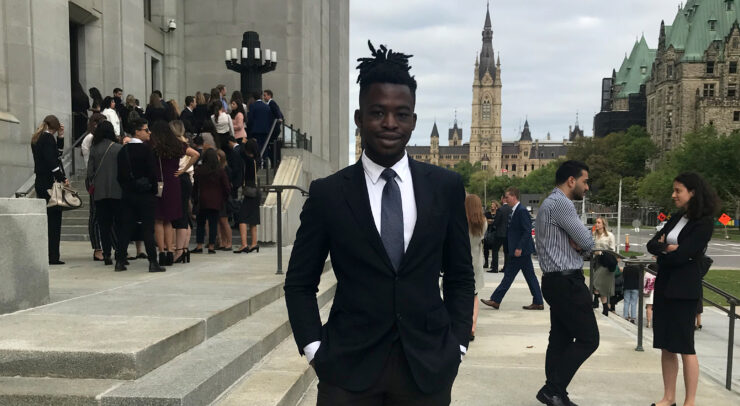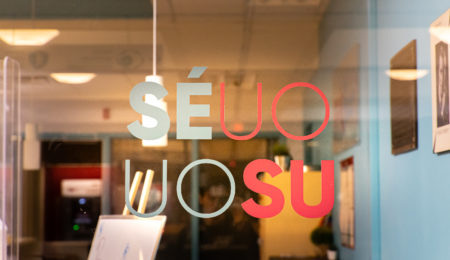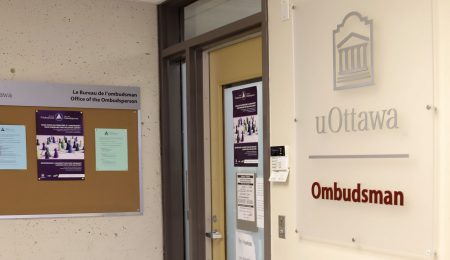Student wellness, decolonizing spaces at heart of Faye’s platform
This interview is part of our series of articles profiling the presidential candidates in the upcoming general elections for the University of Ottawa Students’ Union (UOSU) that will be held from March 25-27. Both candidates were asked the same set of questions for consistency. Answers have been edited for length and clarity. These questions were answered via email.
Babacar Faye is a third-year political science and law student. He’s also a member of the UOSU’s Board of Directors (BOD).
The Fulcrum: What previous experience makes you well-suited to be the UOSU’s president?
Babacar Faye: The role of the president of UOSU is a unique position which demands the ability to listen and respond when needed, and also to act and always be present to support the union and students wherever needed.
Throughout my undergraduate degree, I’ve always made an effort to be active and supportive in the causes I involved myself in. Amnesty International at the U of O was my first experience in university. I had always been involved in high school, being president of my student council and representing the school at the school board, and was initially reluctant in university, considering my program required me to maintain a certain average. This experience drove me to push for change wherever I was involved.
As co-president of the U of O pre-law society, an academic club with the purpose of helping students prepare for law school, I helped adapt the club to the needs of francophone students by creating a bilingual position within the club and translating all materials for francophones. This experience, as well as working on IPPSSA’s public administration committee, were truly sobering in that they pushed me out of my comfort zone, and taught me about the importance of the networks we make as students. Be it reaching out for sponsorships, organizing panels or seeking invitees for conferences, I came out of the experience with a key understanding of the daily work students put in to support student life, the financial and logistical support student clubs and associations need to sustain campus life.
In addition to sitting on UOSU’s first elected BOD, I also started this year as head safety ambassador for UOSU’s 101 Week. Though I had the initial experience of being a guide for IPPSSA in the previous year, I learned a lot about the effort put in by RSGs, the union and all student leaders to set up 101 Week. It’s easy to say students play an important part in building student life, however there’s much more to the part they play in organizing and offering services for themselves, as well as for their peers and generations of students to come. On the BOD that became more apparent for me as I had the opportunity to contribute in the beginnings of a new union. Though there were difficulties at times, I saw a group of people work together to make positive change on campus. I saw students take action into their own hands. For me, it was meaningful to take part in this action through participating in protests for mental health services, Indigenous self determination or against OSAP cuts, inter-union coordination and sitting on the advocacy, executive oversight, francophone affairs and student life committees. I also had the opportunity to listen, hear diverse points of views and learn from my peers in my position. I am honoured and humbled to have been able to have gone through these many experiences and believe I can use them to the best of my abilities to lead UOSU as it’s first president.
The Fulcrum: Why are you running for president?
Babacar Faye: Last year, I ran for the BOD because I was frustrated with the discussion and lack of action around the issues our student movements were confronting, combined with general apathy, despite our troubled year. Yet, I was also inspired by the work students from the past and current union had put in to build our student movement. Though the faculty of social sciences seats were all contested, others barely had any candidate. This year there are even less candidates. Students get involved in other ways, through clubs and student associations. However, when it comes to how things are run, less people are willing to fully involve themselves or are interested in the process. This is understandable, given the circumstances which gave birth to the UOSU. Nevertheless, everywhere I go and in every space I am active in, a common theme is the perseverance of students willing to engage with their peers, the university and their community to make a long-lasting contribution to their environments.
Students have fought to end racism on campus, they’ve denounced provincial cuts to education, strikes against climate change, spoke out in the name of Indigenous self-determination, fought for adequate mental health services, and many more. I am running to honour and highlight that perseverance and to promote and extend their experience and ethic to all students.
Through my experience on the board, I’ve seen determined individuals fight to create a positive and welcoming atmosphere for all. I saw the beginnings of a union with a strong potential and a burgeoning community. I also saw students struggle to be listened to, others struggling to find their place in our community and some demanding their space. We can do more as directors, execs or just students, and UOSU is a central organization in highlighting how important it is to stay engaged. I’m running to create spaces for all students, by uniting and uplifting my peers.
The Fulcrum: The president position is new this year for the UOSU. In your eyes, what do you see the union’s president doing, and why is it an important position to have?
BF: Sitting on the BOD gives important insights on the needs and internal operations of the student union. I had the opportunity to sit through the creation and participate in the co-creation of the role of the president. I was initially against the creation of this role, as a huge concern was the fear of reverting back to a hierarchical structure, which the UOSU had moved away from to promote communal management and prevent competition between executives, fostering a positive work environment within the union.
This position’s roles and responsibilities were constantly amended and adjusted to better reflect the spirit of the referendum in which students voted last year for a collaborative approach to leading this union. The president is a reliable and trustworthy point of contact for all and plays a key role in the leadership of the union. The president needs to be able to listen, and also be responsive and active. One of the difficulties this year was that the executive committee had too many portfolios and also had a hard time allocating responsibility for the different tasks that came up to support the union. The president will support commissioners and ensure nothing gets left behind. The role of the president is to ensure collaboration and harmony and to demonstrate clear leadership within the union where needed. They will be instrumental in the operation and smooth running of the UOSU and will play a key role in engaging the student community as the union turns to building a vision for the future.
The Fulcrum: What projects or goals do you hope to accomplish if elected to be the UOSU’s first president?
BF: If elected as UOSU’s first president, I hope to focus on reliability, wellness and representation.
In the first summer months of my mandate, I want to outline a long-term plan in collaboration with the executive committee that would go through multiple consultations in the school year until the General Assembly. It would consider elements such as financial stability, campaigns, sustainability and equity. This plan would be renewed regularly. I hope to ensure businesses — such as Pivik and Cafe Alt — are profitable by supporting creative programming and essential products, like Pivik brownies, are offered. I want to adopt a holistic approach to the management of the student union while ensuring consistent and durable support to students and our community.
I want to take action for mental health services by looking into the renegotiation of our student health plan for expanded coverage and no out of pocket expenses. We also need a shared care model for mental health services, and the university needs to move toward centralizing resources for mental health services. I hope to push for the development of a wellness centre to be considered.
Finally, I want all students to be represented. My goal is to listen first, learn, mediate, and seek to understand and support the demands and actions of the diverse groups within the student body. I want the union to be a community with strong support systems, that is vocal and active. I want to continue the work of my predecessors and be on the frontlines of change on campus and in our community.
The Fulcrum: What areas of weakness do you see in the UOSU and the campus as a whole that you would like to improve on next year?
BF: Sitting on the BOD has given me a better outlook on the areas the UOSU may improve in next year. I believe communication is the foundation of all relations, and clear and consistent communication from UOSU can go a long way. This means publishing notices for BOD meetings and important meetings days ahead of time, sharing events in a timely manner, publishing committee minutes and meeting locations, establishing clearer and more defined processes. We need to be active and responsive, we need to be proactive and we need to listen more.
We also need to address that perceived culture of exclusivity in student government. We need to open up and be interactive, engaging and inviting our peers to take part in our work.
Given our special circumstances and the additional tasks commissioners had this year, another difficulty the UOSU had was in engaging students and getting them invested in how the UOSU is run. There are more candidates for commissioner positions than for the BOD. This is a failure on all of us in leadership positions to engage our peers. There are seven executives, and a BOD cannot efficiently hold the executive committee accountable with such underwhelming numbers. One of my priorities immediately after being elected would be reaching out to RSGs to form appointment committees and collaborating with them to do so. I think this is essential to the functioning and responsibility of the union. This would also be the time many RSGs would have elected new execs and would be recruiting for appointed positions. This includes hiring an equity commissioner, which would be essential to creating anti-oppression and sexual violence support and prevention training for BOD members, execs, employees, and 101 Week.
The Fulcrum: The mental health crisis on campus has emerged as a major issue for many U of O students. As president. How do you plan on responding to these concerns and acting on them?
BF: The university has a problematic relationship with wellness. Our university has begun to make efforts, however these aren’t enough. We can’t afford to drag on with consultations when it’s been proven throughout our country and on campus that the university needs to take action to provide adequate services for mental health to its students. An important document that came out this year was the Roadmap to Wellness, outlining key recommendations for the university’s approach to mental health on campus, and I plan to follow the administration closely on this.
However, I want to make strides for wider change through the development of a wellness centre, exclusive to students, where they can access all of the resources they need. I also want to focus on the pressing need for a diverse counselling staff sensitive to the different needs and the intersections of identity factors — race, gender identity, sexuality, origin and experience — influencing mental health.
As president, I will ensure the union acts by working with the operations commissioner and equity commissioner to seek a new, more equitable health plan, including expanded coverage for mental health services and no out of pocket fees. At a smaller level, we can adapt events such as 101 Week and provide mental health first aid training to guides, BOD members and staff. In the transition between unions, we adopted the previous plan without reevaluating our choices. In conversation with other students, another idea that I really liked was the creation of a committee on mental health to hold true to our word. We are losing our classmates, our friends, our classmates, our brothers and sisters and our future changemakers. We’ve lost six people too many and it’s not normal. I strongly believe that as a force, together, we can act to help put an end to this wave of loss on campus.
The Fulcrum: Racism and discrimination are also two issues that have come to the forefront for many students over the past year. As president, how do you plan on responding to these concerns and acting on them?
BF: As many Black students were, I was outraged, however not surprised, when the carding incidents came to light at the beginning of the year. These are not new experiences, just more apparent with social media. This does not discount the inhumanity and humiliation of these incidents. Like many of my peers, I felt powerless. I was proud to see my peers rise up and push for spaces to be made for them, no longer to be denied.
I grew up as a francophone in an open community where I could be proud to be Black and Muslim. I know that in many spaces, my peers and I are perceived as a threat or an unwelcome presence because of the colour of our skin. Sadly, many BIPOC suffer through racism, almost as a rite of passage in our community. I am blessed to have had the environment to make me comfortable with my skin tone and to have been raised by proud African parents, a staunchly feminist mother, to embrace its power. There is strength in diversity and I hope to bring out that strength as president of UOSU by opening up and including BIPOC in all conversations. This means, within UOSU governance structures, creating a round table for equity-based partners for extensive collaboration throughout the year, adding two representative positions to the BOD, and also balancing the addition of two positions to the executive committee. We can also strive for more inclusion of BIPOC in staples such as 101 Week through initiatives like incorporating Black Frosh events and holding the ISA’s Powwow.
While recognizing my privilege as a straight bilingual man, I want to decolonize our spaces and work to dismantle white supremacist institutions. I will seek to engage with partners within and around the U of O community to create a diverse campus-wide coalition and create a platform to speak on discrimination and inclusion.
The Fulcrum: How will you work with the administration to address these issues?
BF: The committee for an anti-racist and inclusive campus membership is an essential point of communication and dialogue with the administration for students to express their frustrations and demands for action from the administration. The student leaders who’ve sat on the committee have done groundbreaking work. Their experience can’t be forgotten. They’ve set precedents for Black students everywhere, and I hope this committee continues their work in the next year and to support it in any capacity it allows. We need to push to permanently end carding on campus and to reform the practices of our protection services. We need a more diverse faculty and staff that understands and can guide them through their academic experience.
Recently, the U of O held a public forum on sharing the best practices to promote anti-racism and inclusion on campus, meant to be an opportunity to educate students as well as faculty and the administration. Yet, this was met by an underwhelming promotion and attendance and remarks from our president that showed our administration still had ways to go to see the true reality of BIPOC on campus. Nevertheless, I still saw students and faculty speak passionately and without reservation for their space and I hope to create more of these spaces.
Our university needs to move to action and be leaders on campus. It is essential for the administration to maintain an approach to addressing racism that is rooted in the experiences of BIPOC students and faculty.
The Fulcrum: While the Student Choice Initiative (SCI) has been struck down by the Divisional Court of Ontario, the province is in the process of overturning the decision. How will you approach budgeting and planning for the year ahead with this in mind?
BF: As a law student, the struggle in the courts against the SCI is something I pay close attention to. Given the possibility of a reversal of the decision, we need a careful and measured approach to budgeting and planning for the year ahead. A key practice begun by the executive committee is putting money aside in a contingency fund in the event that the union’s funding is threatened. Currently, there is $210,000 in our contingency fund and $210,000 in the future capital expense fund. Additionally, with the year having been cut short (due to COVID-19), a few expenses have been spared for the union. I will continue that practice, in order to create a solid financial foundation for the UOSU. In collaboration with the operations and equity commissioners, as well as with the directors of finance and services, I will plan an equitable and cost-cutting budget alongside a regular budget in preparation.
We must also not forget RSGs and student associations. Should the SCI be reinstated, they would need consistent support, logistically and financially, as well as in promoting their opt-in campaign. These groups will receive the support they need in the interest of preserving and strengthening the student movement. If elected, I would seek the creation of a voluntary participatory fund to which associations can contribute. This would be used to engage and create sustained interest in the services student groups provide, promoting their value. This would also be used as a contingency fund for clubs and student media in the event that the SCI be reinstated. I will work with the advocacy commissioner to build a campus-wide opt-in campaign, highlighting the value of the services and representation student groups offer.
The Fulcrum: Why should students vote for you?
BF: Students should vote for their best interests and the interests of all of their peers. As members of a single body — the UOSU — we share a common experience in which there are values we defend, changes we demand, and goals we seek to achieve. Throughout my undergrad, I’ve been passionate and enthusiastic about the many opportunities and the privilege we have to create meaningful change in our surroundings. Through a range of experiences, I worked consistently and constantly to listen and engage with all of my peers. As a director, I’ve strived to proudly represent my colleagues and community and defend the values students upheld when choosing UOSU. Throughout my mandate, a common thread to all of the action I’ve seen is the passion my colleagues hold for their community. Be it in my experience as head safety ambassador during 101 Week or in supporting protests for better mental health care, I was inspired by the resilience of my colleagues and their fight to make this campus a better, more welcoming environment for all students.
I want to help build UOSU into a long-lasting institution that empowers and uplifts all students, creating a community where all have their place and can work together towards collective and individual progress. I’m asking students to vote for me because I am tired of beating each other down and I want to unite students behind our student movements. I am asking students for their trust, their openness and their support in creating a cross-campus coalition for all students.
Read our interview with Jason Seguya, who is also running to be UOSU’s president, here.





